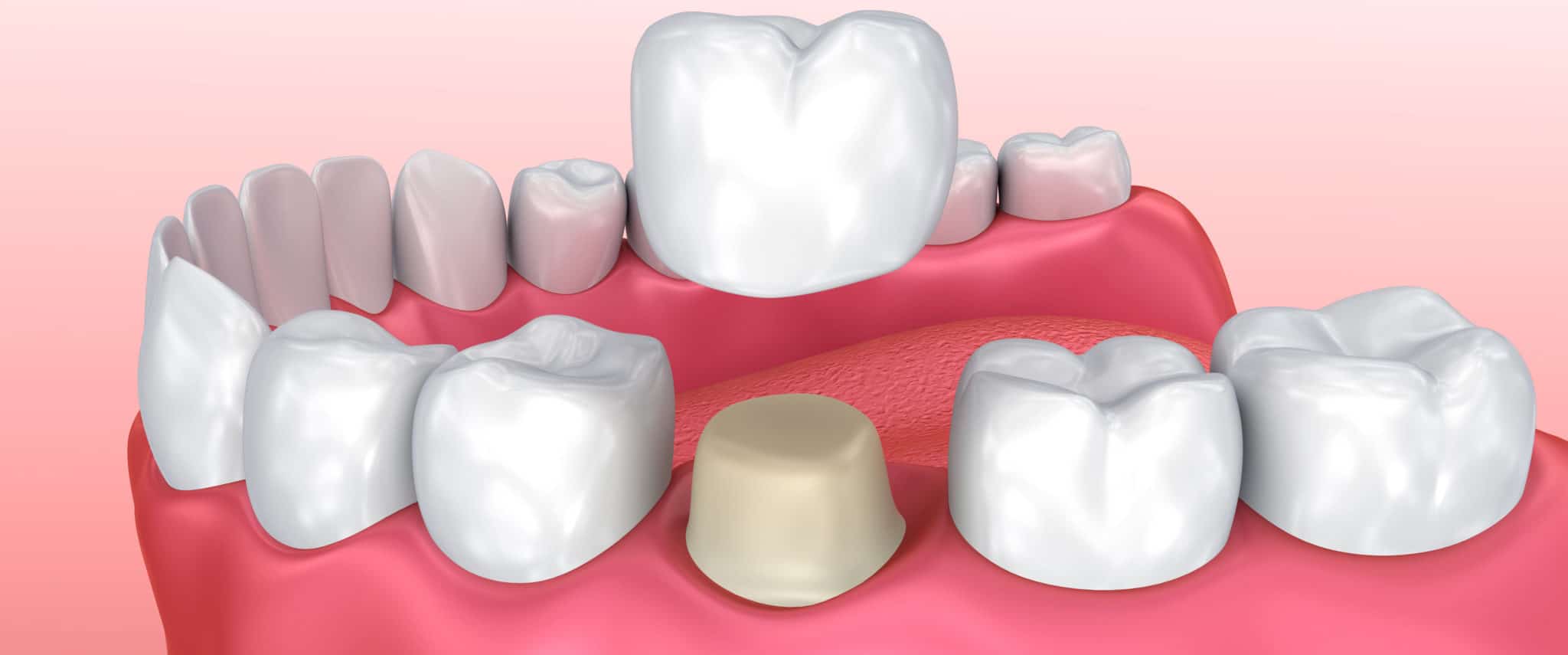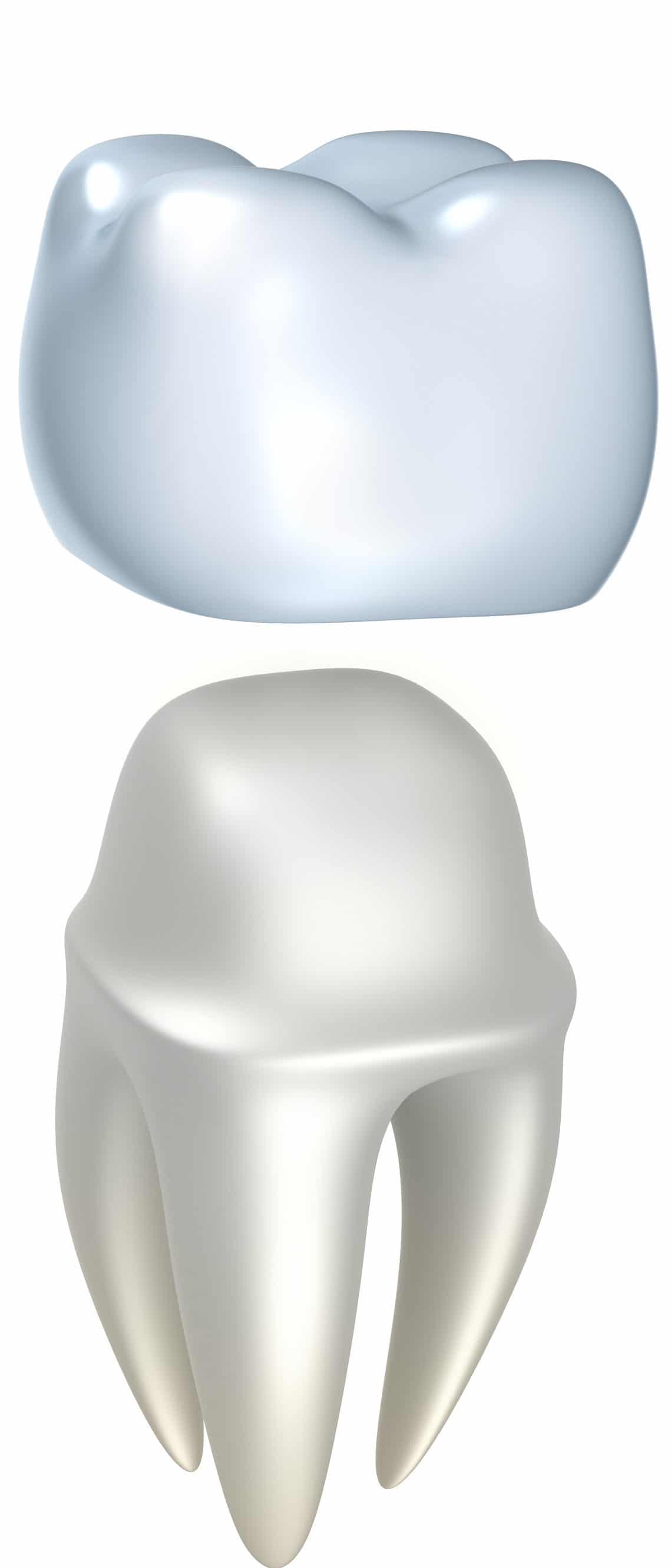Dental Crowns
In Brunswick & Maine
If you find yourself hiding your smile due to damaged teeth, then consider speaking with Dr. James A. Oshetski about Dental Crowns! Dr. Oshetski can answer any questions you have, help you determine if you are a candidate for treatment, and install the crowns to rejuvenate your teeth. Call (207) 729-1159 today to schedule your consultation!
What Is A Dental Crown?
A dental crown is a restoration that covers or caps a tooth, restoring it to its normal size and shape while strengthening and improving its appearance. Crowns are necessary when the tooth is broken down to the point where a filling will not be effective.

Benefits Of Dental Crowns
A dental crown can be used for various reasons including covering discolored or misshapen teeth, and in conjunction with bridges and dental implants. Other benefits of dental crowns may include:
- Holding a cracked tooth together to prevent further damage
- Covering and supporting a tooth with a large filling
- Restoring a broken tooth
How Long Do Dental Crowns Last?
On average, a dental crown should last around 15 years. However, when taken care of diligently, it’s not uncommon for a crown to last for 25 to 30 years. Often, they will last the remainder of the patient’s life. Whether you opt for porcelain or zirconia, the lifespan should be similar.
The lifespan you achieve for your crown has much to do with the amount of wear and tear the crown takes your oral hygiene practices, and things you do such as chewing ice or opening packaging with your teeth. Good habits and good hygiene make for happy, enduring crowns.
The Dental Crown Procedure
The dental crown process takes place in two phases or appointments. At the first appointment, the tooth is prepared by filing or reshaping, so the crown can fit in securely and comfortably. The area around the tooth is numbed throughout the procedure with a local anesthetic. After the tooth is prepared, a state of the art digital impression is made. The data is then sent to a laboratory to make a custom crown, which usually takes two to three weeks. Patients are given a temporary dental crown until the permanent crown is ready.
At the second appointment, the new crown is inspected for proper fit and tooth color. The temporary crown is then removed and the new one is cemented onto the tooth.
Does The Dental Crown Procedure Hurt?
When Dr. Oshetski is preparing your tooth for the crown, removing some of the healthy teeth on all sides and on the top, the tooth being restored is numbed with a local anesthetic. This keeps you from feeling anything. That tooth, which will be covered with a temporary crown while we await the fabrication of your permanent crown, may have some sensitivity to hot and cold, and the gums around it may be a little sore. Any discomfort is easy to manage with over-the-counter pain medication.
Removing your temporary crown and placing your new permanent crown does not involve any pain. Once we place your permanent crown, any tooth sensitivity will resolve, and your new crowned tooth will feel great.
What Our Patients Have to Say
“What an incredible team of professionals. Dr. Oshetski is the best dentist I have ever had. Even for multiple fillings and crowns there is never any pain and they are so accommodating with my schedule. Even stayed late when I needed an emergency visit. On top of that the views and the massage chairs are wonderful. If you are looking for a new dentist I would recommend you try them out.” – June
What Are The Different Types Of Dental Crowns?
There are several different methods of crown restoration, each using a different crown material. Different types of crown material include:
Porcelain-Fused-To-Metal or PFM Crowns
PFM crowns can be color-matched to the teeth. Second, only to all-ceramic crowns in appearance, porcelain-fused-to-metal crowns look like normal teeth. In some cases, the metal underlying the crown’s porcelain can create a dark line. PFM crowns tend to wear down opposing teeth more than metal crowns. The crown’s porcelain portion can also chip or break.
Monolithic Zirconia Crowns
These crowns are the ultimate material to restore teeth with strength and esthetics. Zirconia is a powder at room temperature, but when heated and stabilized with a compound called Yttria, it forms into a very strong and durable white material. Together with digital cad/cam milling, these crowns are the most accurately fitting crown available. Cemented with resin cement, these crowns have the best prognosis for longterm reliability.
They are not as strong as PFM or gold crowns, and they may wear down opposing teeth more than metal or resin crowns. Because they are the most cosmetically pleasing, they are commonly used for the front teeth.
Caring For Your Dental Crowns
Crowns don’t require any special dental care. But don’t think the tooth under the crown is immune to decay. While you crown can’t decay, the tooth under it still can. So, brush twice daily for two minutes and floss once daily. Pay special attention to the area where your gums meet your crowned tooth.
As mentioned above, losing bad habits such as chewing ice and biting fingernails is some of the best care you can give your crown. This will ensure you enjoy your crown for as long as possible.
Are There Any Foods or Drinks that Should Be Avoided After Getting a Dental Crown?
You can eat normal foods with a dental crown, but some choices can impact the lifespan of your crown. When your crown is first placed, it’s a good idea to chew on the other side of your mouth for a few days. This ensures the cement will harden and set effectively. Then you can go back to chewing normally.
When your crown is new or with a temporary crown, you’ll need to avoid sticky foods like caramel and gum. Hard foods such as nuts should also be avoided, as should overly hot and cold foods and drinks. This only applies to your temporary crown.
Once your permanent crown is placed and the cement is hardened you can eat anything. But, again, this depends on you. You will want to avoid caramel and candy such as taffy, as they may pull your crown loose. You’ll also want to avoid any really hard candies, such as jawbreakers, as least on the side with your crown. These food choices are up to you. Nuts and vegetables are excellent foods for your diet, and it would be a waste to completely avoid them. You may want to chew them on the side opposite your crown, however, as they may loosen the crown over time.
Chewing ice, biting your fingernails, and using your teeth to open packaging, while not technically food choices, need to all be stopped now that you have a crown.
Cost Of Dental Crowns
The cost of your dental crown depends on a few factors. Porcelain crowns are more expensive than gold crowns, but they look a million times better. Zirconia crowns are more expensive than porcelain crowns. The cost can also vary depending on the tooth that is being crowned.
Dental insurance will also cover part of the cost of a crown. At Dr. Oshetski’s we work with your insurance provider to get the maximum coverage for your crown.
After Dr. Oshetski sees your particular situation, he can give you an accurate estimate of what your crown will cost.
Complications With Dental Crowns
Pain Or Sensitivity When Biting
This usually means that the crown is too high on the tooth. If this is the case, the dentist will be able to fix the problem by adjusting the crown. With integrating digital bite technology, Dr. Oshetski, commonly finds dental crowns inadequately adjusted or interfering with the bite causing many issues.
Fixing Chipped Porcelain Crowns
This is a common side effect of PFM crowns and usually, the only way to repair it is to replace the whole crown. Chipping in porcelain crowns is a sign of a bad bite or patient that has a clenching or grinding problem. Dr. Oshetski routinely treats and restores these patients back to a healthy bite and commonly uses Zirconia crowns in high force areas that can’t chip like PFM crowns.
Loose Dental Crown
If the fit of the crown is inaccurate, cavity and gum inflammation that can result. Cement washes out from underneath the crown, bacteria can then leak in and cause decay. This condition needs to be detected soon before any irreversible damage to the tooth or bone results in tooth loss. If caught soon enough, the crown may be replaced with an accurate one as long as enough tooth is above the gumline.
Call Dr. Oshetski For a Consult in Brunswick, ME!
Restore your smile today with dental crowns!
Call our Brunswick Office Phone Number to schedule your dental crown consultation with Dr. James A. Oshetski. You can also fill out the form in our contact page, and our staff will help you set up your appointment.


